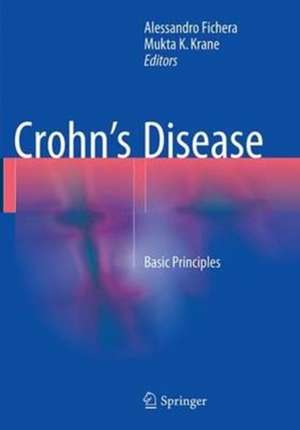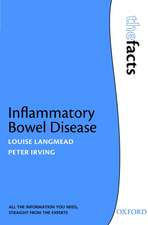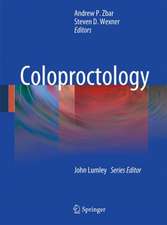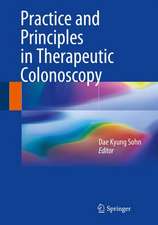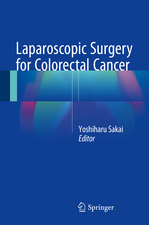Crohn’s Disease: Basic Principles
Editat de Alessandro Fichera, Mukta K. Kraneen Limba Engleză Paperback – 22 oct 2016
| Toate formatele și edițiile | Preț | Express |
|---|---|---|
| Paperback (1) | 474.32 lei 38-44 zile | |
| Springer International Publishing – 22 oct 2016 | 474.32 lei 38-44 zile | |
| Hardback (1) | 690.08 lei 38-44 zile | |
| Springer International Publishing – sep 2015 | 690.08 lei 38-44 zile |
Preț: 474.32 lei
Preț vechi: 499.29 lei
-5% Nou
90.76€ • 95.02$ • 75.10£
Carte tipărită la comandă
Livrare economică 01-07 aprilie
Specificații
ISBN-10: 3319356275
Pagini: 306
Ilustrații: XIII, 306 p. 95 illus., 55 illus. in color.
Dimensiuni: 178 x 254 mm
Ediția:Softcover reprint of the original 1st ed. 2015
Editura: Springer International Publishing
Colecția Springer
Locul publicării:Cham, Switzerland
Cuprins
Recenzii
Textul de pe ultima copertă
Written by recognized experts in their field, Crohn’s Disease: Basic Principles highlights the integrated multidimensional aspect of caring for patients with Crohn’s disease and will be of great value to colon and rectal surgeons, general surgeons, gastroenterologists, internists, as well as fellows and upper level residents in training.
Caracteristici
Descriere
Crohn’s Disease: Basic Principles provides a comprehensive and state-of-the-art overview of the current diagnosis and treatment strategies for Crohn’s disease. Care of these patients and clinical conditions can be quite complex and often require a multidisciplinary approach. Sections of the book are based on the most current, evidenced-based resources and have been structured to review the etiology and diagnosis of Crohn’s disease, discuss advances in medical and surgical treatment, illustrate emerging technologies impacting the care of patients with Crohn’s disease, and examine functional and quality of life outcomes in this patient population. The text reviews our understanding of the influence of molecular and genetic factors in the development and pattern of Crohn’s disease. Current methods of diagnosis and strategies in the medical management of patients with Crohn’s disease are evaluated including the use of biologic agents. Resection and bowel sparing techniques for primary and recurrent disease as well as advances in endoscopy and laparoscopy are discussed in detail. In addition, factors influencing the quality of life of patients with Crohn’s disease are examined including nutrition, enterostomal care, fertility, and sexual function. Written by recognized experts in their field, Crohn’s Disease: Basic Principles highlights the integrated multidimensional aspect of caring for patients with Crohn’s disease and will be of great value to colon and rectal surgeons, general surgeons, gastroenterologists, internists, as well as fellows and upper level residents in training training.
